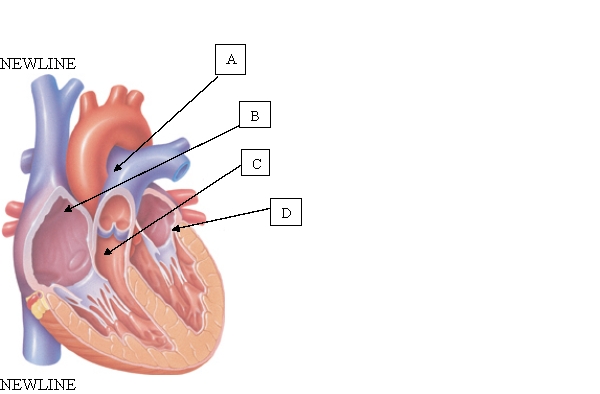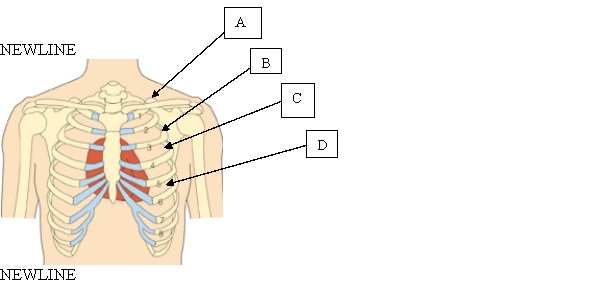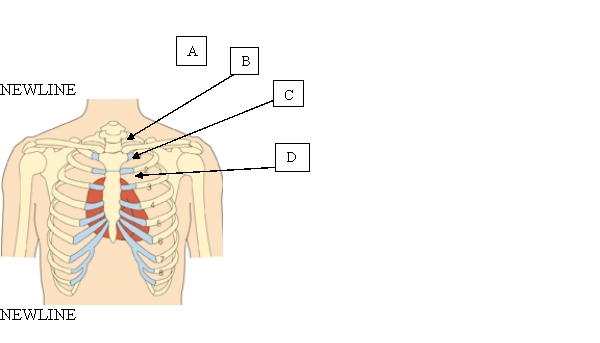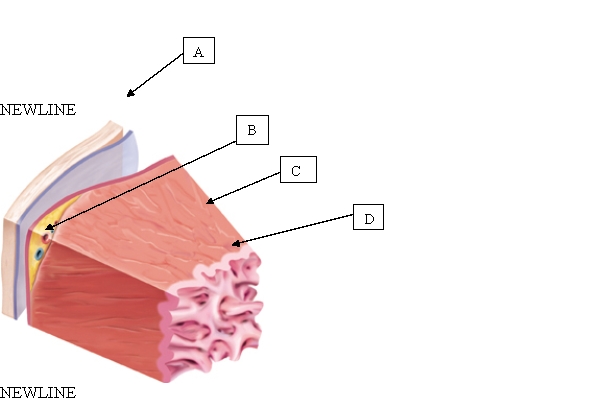Deck 19: Cardiovascular System
Question
Question
Question
Question
Question
Question
Question
Question
Question
Question
Question
Question
Question
Question
Question
Question
Question
Question
Question
Question
Question
Question
Question
Question
Question
Question
Question
Question

Unlock Deck
Sign up to unlock the cards in this deck!
Unlock Deck
Unlock Deck
1/28
Play
Full screen (f)
Deck 19: Cardiovascular System
1
During the focused interview, the client answers the nurse's questions. Which statements by the client suggest that the client has an increased risk of developing cardiovascular disease? Standard
A) "I have been stressed out since my divorce last year."
B) "I'm what you call a Type C personality."
C) "I went on this new diet because I gained 30 pounds in the last 9 months."
D) "On my new diet, I can eat only grains and vegetables."
E) "I think about my job all of the time."
A) "I have been stressed out since my divorce last year."
B) "I'm what you call a Type C personality."
C) "I went on this new diet because I gained 30 pounds in the last 9 months."
D) "On my new diet, I can eat only grains and vegetables."
E) "I think about my job all of the time."
"I have been stressed out since my divorce last year."
"I went on this new diet because I gained 30 pounds in the last 9 months."
"On my new diet, I can eat only grains and vegetables."
"I think about my job all of the time."
"I went on this new diet because I gained 30 pounds in the last 9 months."
"On my new diet, I can eat only grains and vegetables."
"I think about my job all of the time."
2
The client's healthcare provider determines that the client's left ventricle is functioning adequately. When teaching the client about the left ventricle, which location will the nurse include in the educational session? 
A) A.
B) B.
C) C.
D) D.

A) A.
B) B.
C) C.
D) D.
D.
3
The nurse is performing a focused interview with an adult male client who recently experienced a myocardial infarction. The nurse requests information about how he felt during the time of the myocardial infarction. Which client statement would be unexpected?
A) "I couldn't catch my breath."
B) "My chest didn't actually ever hurt."
C) "My wife said I looked like someone poured water all over me."
D) "I got so sick to my stomach."
A) "I couldn't catch my breath."
B) "My chest didn't actually ever hurt."
C) "My wife said I looked like someone poured water all over me."
D) "I got so sick to my stomach."
"My chest didn't actually ever hurt."
4
The nurse is caring for a client admitted with a grade-3 heart murmur heard during systole. Which cardiac conditions does the nurse anticipate based on this data?.
A) Mitral regurgitation.
B) Mitral stenosis.
C) Aortic stenosis.
D) Pulmonic stenosis.
A) Mitral regurgitation.
B) Mitral stenosis.
C) Aortic stenosis.
D) Pulmonic stenosis.

Unlock Deck
Unlock for access to all 28 flashcards in this deck.
Unlock Deck
k this deck
5
An adult client is admitted to the hospital with complaints of increasing fatigue. The client's history is remarkable for rheumatic fever as a child. The nurse hears a diastolic murmur at the apex when the client is in the left lateral position. The murmur is described as a rumble without radiation. Which diagnosis does the nurse anticipate based on this data?
A) Tricuspid regurgitation.
B) Mitral regurgitation.
C) Mitral stenosis.
D) Pulmonic stenosis.
A) Tricuspid regurgitation.
B) Mitral regurgitation.
C) Mitral stenosis.
D) Pulmonic stenosis.

Unlock Deck
Unlock for access to all 28 flashcards in this deck.
Unlock Deck
k this deck
6
The nurse is interviewing a client who has recently been diagnosed with atherosclerosis in the coronary arteries. Which question by the nurse is the priority when determining risk factors for this condition?
A) "Can you please tell me about the vitamins or supplements that you take?"
B) "Have you ever been diagnosed with rheumatic fever?"
C) "Do you smoke or are you exposed to secondhand smoke?"
D) "Have you ever had a diagnostic test, such as an electrocardiogram, stress test, or echocardiogram, or a surgical procedure for a cardiovascular problem?"
A) "Can you please tell me about the vitamins or supplements that you take?"
B) "Have you ever been diagnosed with rheumatic fever?"
C) "Do you smoke or are you exposed to secondhand smoke?"
D) "Have you ever had a diagnostic test, such as an electrocardiogram, stress test, or echocardiogram, or a surgical procedure for a cardiovascular problem?"

Unlock Deck
Unlock for access to all 28 flashcards in this deck.
Unlock Deck
k this deck
7
The nurse is performing a cardiac assessment on an older adult client admitted with hypertension. The nurse determines that the apical impulse can be palpated in an area 2 cm in diameter at the point of maximal impulse. Which conclusion by the nurse is appropriate based on this data?
A) Left ventricular hypertrophy.
B) Aortic stenosis.
C) Right ventricular volume overload.
D) Enlarged left atrium.
A) Left ventricular hypertrophy.
B) Aortic stenosis.
C) Right ventricular volume overload.
D) Enlarged left atrium.

Unlock Deck
Unlock for access to all 28 flashcards in this deck.
Unlock Deck
k this deck
8
During the cardiac assessment of a client, the nurse hears a loud rumbling during diastole that increases toward the end of the sound. This sound is heard with the bell of the stethoscope over the lower left sternal border. Based on this data, which diagnosis does the nurse anticipate?
A) Aortic stenosis.
B) Tricuspid stenosis.
C) Mitral regurgitation.
D) Pulmonic stenosis.
A) Aortic stenosis.
B) Tricuspid stenosis.
C) Mitral regurgitation.
D) Pulmonic stenosis.

Unlock Deck
Unlock for access to all 28 flashcards in this deck.
Unlock Deck
k this deck
9
The nurse is assessing a client and notes a loud, blowing sound over the right carotid artery. Based on this data, which diagnosis does the nurse anticipate?
A) Mitral stenosis.
B) Aortic regurgitation.
C) Atrial septal defect.
D) Stricture of the carotid.
A) Mitral stenosis.
B) Aortic regurgitation.
C) Atrial septal defect.
D) Stricture of the carotid.

Unlock Deck
Unlock for access to all 28 flashcards in this deck.
Unlock Deck
k this deck
10
The nurse is preparing to assess the client's cardiovascular system. Which client positions will the nurse use when conducting this assessment?
A) Dorsal recumbent.
B) Leaning forward.
C) Right lateral position.
D) Left lateral position.
E) Sitting upright.
A) Dorsal recumbent.
B) Leaning forward.
C) Right lateral position.
D) Left lateral position.
E) Sitting upright.

Unlock Deck
Unlock for access to all 28 flashcards in this deck.
Unlock Deck
k this deck
11
The nurse is performing a cardiac assessment and prepares to palpate the client's heartbeat on the client's chest. Which is the correct location for the nurse to use when conducting this assessment? 
A) A.
B) B.
C) C.
D) D.

A) A.
B) B.
C) C.
D) D.

Unlock Deck
Unlock for access to all 28 flashcards in this deck.
Unlock Deck
k this deck
12
The nurse is reviewing the client's medical record and notes a consistently elevated blood pressure over the last eight years. The client has been noncompliant with lifestyle changes and medication use designed to reduce the client's blood pressure. Today, the nurse is able to palpate a heave on the client's chest. Where is the heavelocated? 

A) A.
B) B.
C) C.
D) D.


A) A.
B) B.
C) C.
D) D.

Unlock Deck
Unlock for access to all 28 flashcards in this deck.
Unlock Deck
k this deck
13
The intensive care nurse is performing a cardiac assessment on a newly admitted older adult client and notes the following findings: peripheral edema, jugular venous distention of 5 cm above the sternal angle when the client is at a 45-degree angle, and an enlarged liver. Based on this data, which diagnosis does the nurse suspect?
A) Pulmonary edema.
B) Left-sided heart failure.
C) Myocardial infarction.
D) Right-sided heart failure.
A) Pulmonary edema.
B) Left-sided heart failure.
C) Myocardial infarction.
D) Right-sided heart failure.

Unlock Deck
Unlock for access to all 28 flashcards in this deck.
Unlock Deck
k this deck
14
The client has a history of rheumatic fever. Which layer of the heart is at the greatest risk for damage due to infection? 
A) A.
B) B.
C) C.
D) D.

A) A.
B) B.
C) C.
D) D.

Unlock Deck
Unlock for access to all 28 flashcards in this deck.
Unlock Deck
k this deck
15
The nurse educator is teaching a group of nursing students to assess heart sounds. Which response by a student indicates appropriate understanding of how S2 heart sounds are produced?
A) "It results from the closure of the mitral valve."
B) "It is a result from the closure of the semilunar valves."
C) "It results from the closure of the tricuspid valve."
D) "It is caused by atrial contraction and ejection of blood into the ventricles in late diastole."
A) "It results from the closure of the mitral valve."
B) "It is a result from the closure of the semilunar valves."
C) "It results from the closure of the tricuspid valve."
D) "It is caused by atrial contraction and ejection of blood into the ventricles in late diastole."

Unlock Deck
Unlock for access to all 28 flashcards in this deck.
Unlock Deck
k this deck
16
During the focused interview, which client statements indicate an increased risk of developing cardiovascular disease?
A) "I was diagnosed with hypothyroidism about 5 years ago."
B) "My doctor always tells me when I come in that my blood pressure is low."
C) "I know my grandmother had diabetes, but every time it has been checked mine has been normal."
D) "My total cholesterol has always been around 170."
A) "I was diagnosed with hypothyroidism about 5 years ago."
B) "My doctor always tells me when I come in that my blood pressure is low."
C) "I know my grandmother had diabetes, but every time it has been checked mine has been normal."
D) "My total cholesterol has always been around 170."

Unlock Deck
Unlock for access to all 28 flashcards in this deck.
Unlock Deck
k this deck
17
The nurse is assessing the client's cardiovascular system. Which techniques are appropriate for the nurse to use during this assessment?
A) Continuing the exam when the client complains of discomfort when lying flat.
B) Auscultating the apical impulse at the fifth intercostal space at the midclavicular line.
C) Examining the client's legs and noting that the client's hair is evenly distributed.
D) Palpating the client's carotid arteries simultaneously to determine pulse strength, rhythm, and rate.
E) Examining the client's hands and fingers and noting the presence of clubbing.
A) Continuing the exam when the client complains of discomfort when lying flat.
B) Auscultating the apical impulse at the fifth intercostal space at the midclavicular line.
C) Examining the client's legs and noting that the client's hair is evenly distributed.
D) Palpating the client's carotid arteries simultaneously to determine pulse strength, rhythm, and rate.
E) Examining the client's hands and fingers and noting the presence of clubbing.

Unlock Deck
Unlock for access to all 28 flashcards in this deck.
Unlock Deck
k this deck
18
The nurse is preparing to assess the female client's cardiovascular system during a routine health assessment visit. Which items should the nurse have available in the room in order to complete the examination?
A) Ruler (metric).
B) Stethoscope.
C) Lamp.
D) Client gown and a drape.
E) An ultrasound machine.
A) Ruler (metric).
B) Stethoscope.
C) Lamp.
D) Client gown and a drape.
E) An ultrasound machine.

Unlock Deck
Unlock for access to all 28 flashcards in this deck.
Unlock Deck
k this deck
19
The nurse is preparing to perform a cardiac assessment on a client. Rank the assessment steps in the order in which they will occur. Standard Text: Click on the down arrow for each response in the right column and select the correct choice from the list.
Response
A) Auscultation of the client's heart, apical pulse, and carotid arteries. Response
B) Inspection of the client's head and neck, chest, abdomen, and extremities. Response
C) Percussion of the client's chest. Response
D) Palpation of the precordium and pulses.
Response
A) Auscultation of the client's heart, apical pulse, and carotid arteries. Response
B) Inspection of the client's head and neck, chest, abdomen, and extremities. Response
C) Percussion of the client's chest. Response
D) Palpation of the precordium and pulses.

Unlock Deck
Unlock for access to all 28 flashcards in this deck.
Unlock Deck
k this deck
20
The nurse is percussing the client's anterior chest and notes a dull sound over an area where lung tissue is normally found. Which conclusion by the nurse is the most appropriate based on this data?
A) This is a normal finding.
B) The client's heart may be enlarged.
C) The client has developed a murmur.
D) The client has a pulse deficit.
A) This is a normal finding.
B) The client's heart may be enlarged.
C) The client has developed a murmur.
D) The client has a pulse deficit.

Unlock Deck
Unlock for access to all 28 flashcards in this deck.
Unlock Deck
k this deck
21
The nurse is performing a cardiac assessment on a healthy older adult client. Which findings may be expected when compared to when the client was middle-aged?
A) Systolic murmur.
B) Increased cardiac output.
C) Increased systolic blood pressure.
D) Increased stroke volume.
E) Slight decrease in heart rate.
A) Systolic murmur.
B) Increased cardiac output.
C) Increased systolic blood pressure.
D) Increased stroke volume.
E) Slight decrease in heart rate.

Unlock Deck
Unlock for access to all 28 flashcards in this deck.
Unlock Deck
k this deck
22
The nurse educator is teaching a group of student nurses about the objectives of Healthy People 2020. Which statement by the student nurse indicates the need for further education?
A) "Parents of school-aged children really need to be educated about the importance of treating strep throat."
B) "African Americans really need to be educated about the symptoms associated with hypertension."
C) "People who smoke are twice as likely to die from a heart attack when compared to those who don't smoke."
D) "African Americans can benefit greatly from education aimed at increasing their understanding about the importance of exercise."
A) "Parents of school-aged children really need to be educated about the importance of treating strep throat."
B) "African Americans really need to be educated about the symptoms associated with hypertension."
C) "People who smoke are twice as likely to die from a heart attack when compared to those who don't smoke."
D) "African Americans can benefit greatly from education aimed at increasing their understanding about the importance of exercise."

Unlock Deck
Unlock for access to all 28 flashcards in this deck.
Unlock Deck
k this deck
23
The nurse notes the pregnant client's blood pressure has dropped from 122/70 mmHg taken during her second month of pregnancy to 118/64 mmHg during her fifth month of pregnancy. Which action by the nurse is most appropriate based on this data?
A) Assess for signs of hemorrhage.
B) Document the blood pressure as a normal finding.
C) Consult the healthcare provider.
D) Tell the client to come in the next day so the nurse can recheck her blood pressure.
A) Assess for signs of hemorrhage.
B) Document the blood pressure as a normal finding.
C) Consult the healthcare provider.
D) Tell the client to come in the next day so the nurse can recheck her blood pressure.

Unlock Deck
Unlock for access to all 28 flashcards in this deck.
Unlock Deck
k this deck
24
The nurse is assessing a client who is 7 months pregnant. Which assessment finding will the nurse document as a normal finding for this client?
A) Increased systolic and diastolic blood pressures when standing.
B) Point of maximal impulse palpated at fourth intercostal space and left of midclavicular line.
C) Bradycardia.
D) Diastolic murmur.
A) Increased systolic and diastolic blood pressures when standing.
B) Point of maximal impulse palpated at fourth intercostal space and left of midclavicular line.
C) Bradycardia.
D) Diastolic murmur.

Unlock Deck
Unlock for access to all 28 flashcards in this deck.
Unlock Deck
k this deck
25
The client is 3 months pregnant and receives education regarding maintaining a healthy pregnancy. The nurse based the education on the objectives of Healthy People 2020 regarding pregnant women. Which client statements indicate appropriate understanding of the teaching session?
A) "I never got my rubella vaccination so I've been staying away from my niece who has rubella."
B) "I stopped taking Accutane for my acne before we started trying to get pregnant."
C) "I have been so careful about taking my insulin now that I'm pregnant."
D) "I have just one glass of wine each evening."
E) "I had to change to a different medication to prevent my seizures before we got pregnant."
A) "I never got my rubella vaccination so I've been staying away from my niece who has rubella."
B) "I stopped taking Accutane for my acne before we started trying to get pregnant."
C) "I have been so careful about taking my insulin now that I'm pregnant."
D) "I have just one glass of wine each evening."
E) "I had to change to a different medication to prevent my seizures before we got pregnant."

Unlock Deck
Unlock for access to all 28 flashcards in this deck.
Unlock Deck
k this deck
26
The nurse is assessing a young adult client and notes the presence of bilateral earlobe creases. Which actions by the nurse are appropriate based on this data?
A) Refer the client to a plastic surgeon.
B) Document this finding as normal.
C) Document the finding and notify the healthcare provider.
D) Ask the client about any history of injuries to his ears.
E) Assess the client's risk factors for coronary artery disease.
A) Refer the client to a plastic surgeon.
B) Document this finding as normal.
C) Document the finding and notify the healthcare provider.
D) Ask the client about any history of injuries to his ears.
E) Assess the client's risk factors for coronary artery disease.

Unlock Deck
Unlock for access to all 28 flashcards in this deck.
Unlock Deck
k this deck
27
The nurse is assessing a full-term African American newborn who is 18 hours old. Which assessment finding would the nurse document as normal for this newborn?
A) Lethargy.
B) Heart rate 115-120.
C) Bulging of the precordium.
D) Pale conjunctiva.
A) Lethargy.
B) Heart rate 115-120.
C) Bulging of the precordium.
D) Pale conjunctiva.

Unlock Deck
Unlock for access to all 28 flashcards in this deck.
Unlock Deck
k this deck
28
The client is admitted to the coronary care unit with a myocardial infarction. Prior to discharge, which client statement indicates that adequate learning has occurred?
A) "I'm just sick to my stomach because I ate something that didn't agree with me."
B) "I think I must have given myself a little too much insulin this morning."
C) "I've been breathing fast and my heart's been racing because my heart's not working right."
D) "Just give me something for the nausea and I can go home."
A) "I'm just sick to my stomach because I ate something that didn't agree with me."
B) "I think I must have given myself a little too much insulin this morning."
C) "I've been breathing fast and my heart's been racing because my heart's not working right."
D) "Just give me something for the nausea and I can go home."

Unlock Deck
Unlock for access to all 28 flashcards in this deck.
Unlock Deck
k this deck


